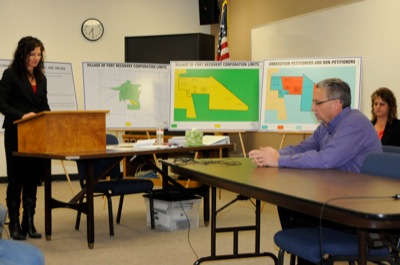Friday, December 4th, 2015
Annexation hearing heated
Fort residents speak out against adding 12 properties to village
By William Kincaid

Photo by William Kincaid/The Daily Standard
Fort Recovery Village Administrator Randy Diller, right, on Thursday responds to questions from village attorney Erin Minor during a public annexation hearing at the county Central Services Building in Celina.
CELINA - More than a half dozen people spoke out in opposition Thursday night during an emotionally charged hearing to solicit input for the annexation of 12 properties into the village of Fort Recovery.
Mercer County Commissioners, who held the public hearing at the county Central Services Building, must within the next 30 days issue an order granting or denying the annexation petition. The decision can be appealed in common pleas court, commissioner Rick Muhlenkamp said.
The petitioners in support represent seven of the 12 affected properties. The annexation area includes 30.481 acres of land to the south of town near state Route 49 and Sharpsburg Road in Gibson Township. Previous discussions on the issue have taken place at village council meetings this year.
Attorney Erin Minor, who represented the village on behalf of the petitioners, asserted annexation is in the best interest of Fort Recovery. Opponents argued they are being forced into the village against their will.
Minor said the village wants to annex all 12 properties, not just the ones whose owners signed the petition because it "would fill a hole that currently exists in the village corporation limits."
She said the territory in question is surrounded on three sides by land already in the corporation limits. For all practical purposes, people living there already are in Fort Recovery, she said.
"It only makes sense to officially make them a part of the town so they can enjoy the same benefits and be governed by the same laws as village residents," Minor said.
The village also wants to annex all 12 properties to prevent islands, she said.
"If we would only annex those who signed the annexation petition, we would have two distinct islands of unincorporated territory inside the village," Minor explained.
Uniformity is needed, she said.
"We don't want the village to become Swiss cheese with pockets of unincorporated areas scattered about, areas where our police department has no enforcement authority, we can't enforce our zoning laws, we have road maintenance issues, we can't run our utility lines and we can't install curbs and sidewalks," she continued.
She said commissioners must grant the annexation petition because it meets all conditions in the Ohio Revised Code.
According to the ORC: "The board's decision rests in part on whether the proper annexation procedures were followed, but the board is also required to find that the area to be annexed is not too large, that the map or plat of the area is accurate and that annexation would serve the general good of the territory to be annexed."
The territory in question is one-twenty-fifth the size of the village and one quarter of 1 percent the size of Gibson Township - "not outside the ordinary for Fort Recovery annexations," Minor said.
Randy Diller testified that during his 21 years as village administrator he oversaw seven annexations varying in size from half an acre to 41 acres. No property owners objected to any of those annexations, he said.
Larger annexations occurred before his tenure, he said
"Back in 1988 the village annexed two different parcels - one was 77 acres and one was 86 acres," Diller said.
Minor said Gibson Township would lose about $569 annually in property taxes if the annexation is granted.
"That represents less than three-fourths of 1 percent of the property tax revenue received by Gibson Township during the 2014 calendar year," she said.
Dave Kaup, a petition signatory and Fort Recovery village council member who becomes mayor in January, plans to develop his 7.912 acres into a residential housing subdivision with 17 lots if the annexation is approved.
The demand for housing in Fort Recovery and the surrounding area is substantial and the supply is virtually nonexistent, Minor said. The proposed subdivision would boost the economy and draw additional tax revenue for Gibson Township, Fort Recovery and Fort Recovery Local Schools, Minor said.
Without annexation, the planned subdivision under Gibson Township requirements would allow only three residential lots instead of 17.
Gibson Township Trustee Mike Thien, who also owns property in the proposed annexation area, spoke on behalf of the township. He opposes the annexation as a trustee and a property owner, he said.
"As a township trustee, we disagree with forcing somebody to change their property just for the fact of freedom," he said. "We know we're going to lose some revenue."
Thien said trustees want to stand up for "the people who are against it who never got the right to vote one way or the other."
Dillan Schulze, who lives with his wife, Paige, on a 7.761-acre parcel at 890 Sharpsburg Road, said he returned to Mercer County after serving four years in the military. The couple found the perfect house right outside the Fort Recovery corporation limit, he said.
"Part of why we bought that property was for the rural setting (is so) whatever we wanted to do with that property we could do with it," he said. "All I've wanted to be was a good productive member of this community, not of the town necessarily."
Schulze said he and his wife would like to pursue small agricultural activity, such as taking advantage of the property's 400 black walnut trees. The village's zoning laws would prohibit that, he said.
He also noted that a village requirement to install sidewalks in front of his property would cost about $5,000.
Pamela Hicks, who lives just outside Fort Recovery, said she feels sorry for the Schulzes. She took umbrage at how the couple is being treated, especially as the Fort Recovery community wants to welcome young people.
She fears her property could be annexed next, she said.
"I actually live on Flaler Road and I have property on Union City Road, so I'm next," she said.
Fort Recovery native Robin Link, who said she sold the property to the Schulzes, delivered a fervent diatribe against city leaders and the annexation process.
"I've always been proud to say I'm from Fort Recovery. Not anymore," she said. "The bullying tactics that's going on, I don't agree with. If the village is so worried about an island, why weren't they worried about it over 20 years ago when they started the creation of this island when they had to connect the industrial park to Indian Heights?"
Link, who accused the town of "shifty half-truths" and "good-old-boy syndrome," said officials should work with the property owners and let them stay where they're at.
She said her father, the late Gus Link, was a prominent businessman who owned K&L Tractors. After her parents died, Link, as executor of the estate, sold the property to the Schulzes, she said.
"If my father would be alive today and sold that land to Dave Kaup or Joe Schmo, (village officials) wouldn't have (sought annexation)," she said. "There's no way that would have happened. I feel like the village has just been sitting there waiting for my parents to die to come in and swoop in on it."
Jane Weitzel said she and her husband, Lavern, have lived for over 30 years on 2.538 acres in the proposed annexation area. She said there has never been problems with clean roads or law enforcement.
"You annex us, our property taxes are going to go a lot higher," she said.
She also said the couple doesn't need sewer or water utilities and balked at the prospect of having to install sidewalks.
"Who's going to pay for that? I don't make that much money. My husband is retired. We can't afford to put sidewalks (in)," Weitzel said.
Thien, speaking as a property owner, said he doesn't like how the village sought signatures for the petition.
"They went through and got seven signatures; they never asked the next five. I think it's pretty much manipulating the vote," he said.
He also questioned the touted annexation benefit of police service.
"The town doesn't offer a 24-hour police department. When they're not on duty, we have to call the sheriff's department. We rely on the sheriff's department anyway," he said.
"Let us live the way we've been living," he continued. "We didn't ask to be in town. We don't think we should be forced into town."
Village and Gibson Township officials were afforded closing statements. Minor acknowledged a few property owners are upset.
"We don't deny them that," she said. "However the village can't make decisions based on the opinions of the few. We have to make decisions based on what is in the interest of the community as a whole."
Thien's closing statement noted the $569 the township stands to lose annually in revenue is about the cost of buying fuel to plow snow in the winter.



